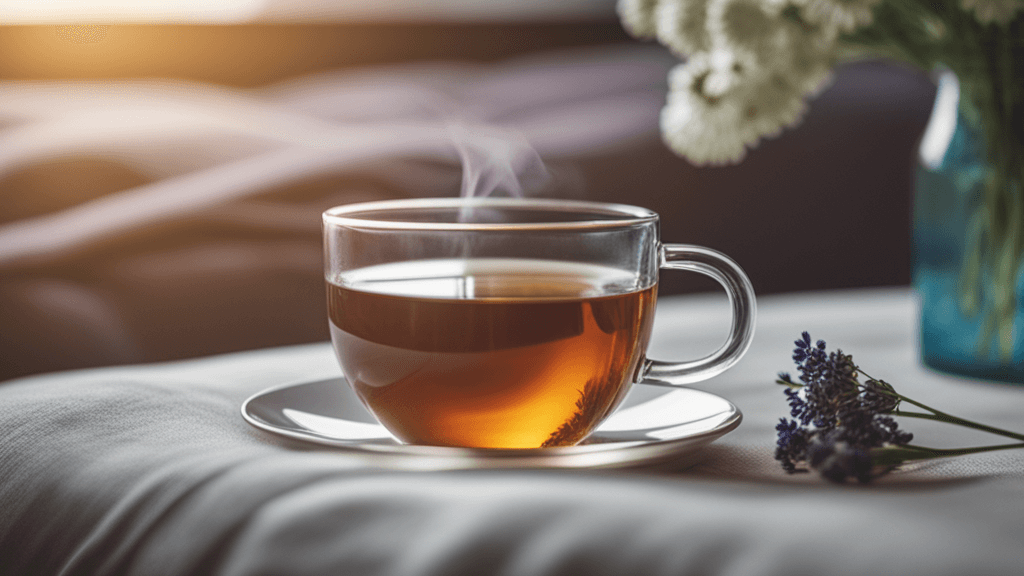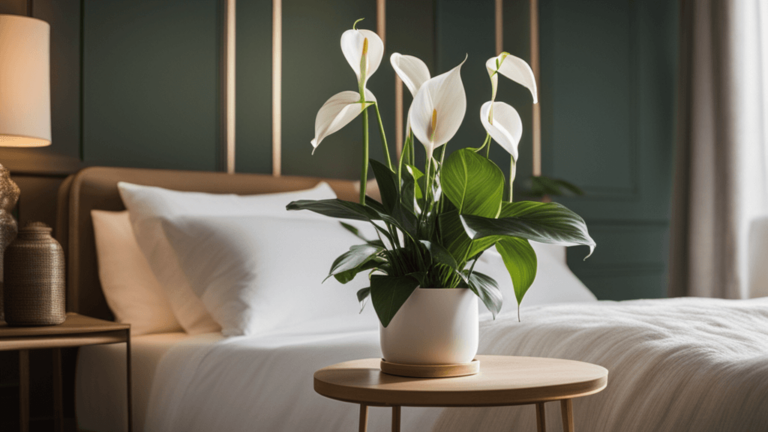5 Best Herbal Teas for Better Sleep: Natural Remedies for Restful Nights
Sleep is a vital cornerstone of human wellbeing, yet countless individuals struggle to achieve the deep rest their bodies require. Our detailed examination of sleep-promoting herbal teas reveals nature’s most effective botanical remedies for conquering sleepless nights. Herbal teas offer a time-honored, holistic approach that provides a gentle, natural alternative to pharmaceutical interventions in our stress-laden world.
These carefully selected botanicals work in harmony with the body’s natural rhythms, addressing the underlying causes of sleep disruption while promoting deep relaxation of both body and mind. From ancient Egyptian healing practices to medieval European herbalism, these herbal allies have consistently demonstrated their ability to support restful, rejuvenating sleep.
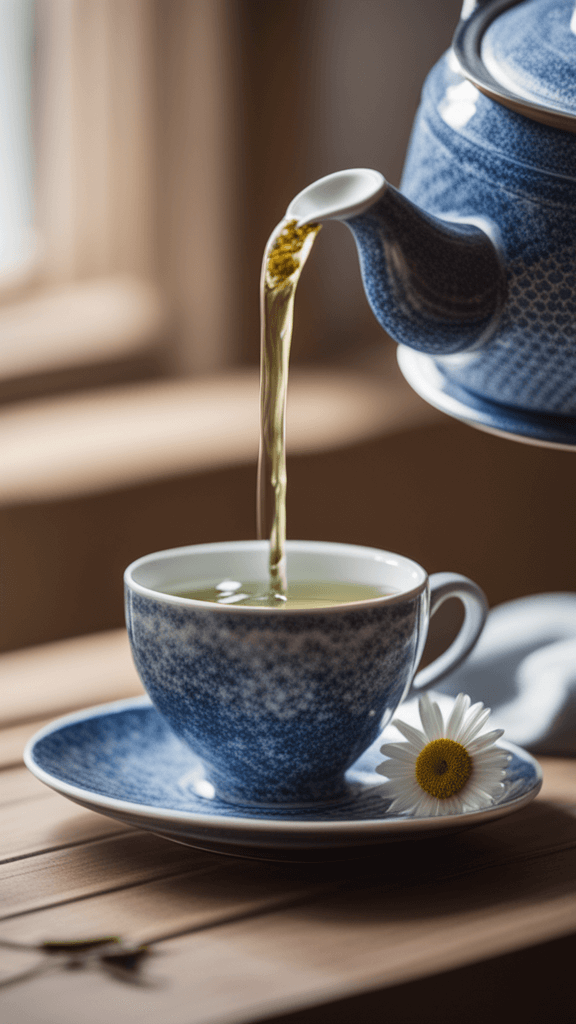
- Egyptian Healing: Chamomile was considered a sacred herb, used in both medicinal and ceremonial practices
- Chinese Traditions: Sleep was viewed as a critical component of holistic health
- Native American Practices: Passionflower and local herbs were used to manage anxiety and promote peaceful sleep
- Medieval European Herbalism: Complex tea blends were developed to address various sleep disorders
Understanding sleep is beneficial to appreciating these natural remedies. Sleep is not a uniform state but a complex cycle composed of multiple stages, including light sleep, deep sleep, and REM (Rapid Eye Movement) sleep. Each sleep stage plays a vital role in physical recovery, memory consolidation, and emotional regulation. Disruptions in these stages can lead to various sleep disorders such as insomnia, sleep apnea, and restless leg syndrome, affecting millions globally.
As we explore the best herbal teas for better sleep, we’ll uncover both traditional wisdom and scientific research behind these natural remedies. From understanding individual herbs like chamomile and valerian root to creating effective blends, you’ll discover how to prepare and incorporate these botanical allies into your evening routine. Whether you’re seeking occasional sleep support or a long-term natural solution, this guide will help you harness the full potential of herbal teas to achieve more restful, rejuvenating nights.
Chamomile Tea: Nature’s Gentle Sleep Inducer
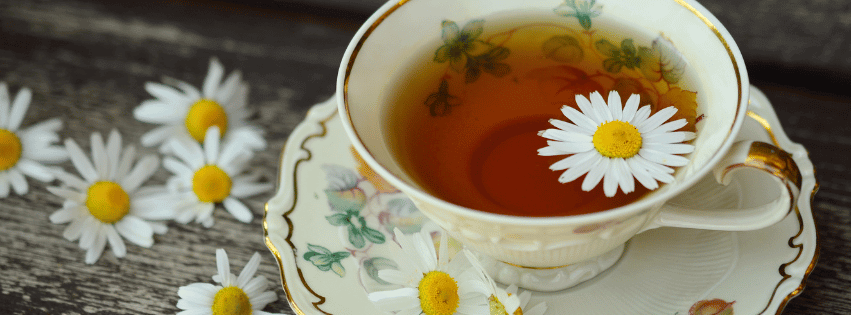
For those seeking a natural, holistic approach to wellness, chamomile tea represents a time-honored remedy. Chamomile has long been revered as a quintessential herbal remedy for sleep and relaxation, with a history of use dating back thousands of years. This delicate, daisy-like flower has been a staple in traditional medicine across cultures, particularly in European and Mediterranean regions, where it was traditionally used to calm nerves and promote peaceful sleep.
A landmark study published in the journal BMC Complementary Medicine found that chamomile extract significantly improved sleep quality in elderly patients. In this research, participants who consumed chamomile extract daily experienced substantial improvements in falling asleep faster and maintaining deeper, more restful sleep cycles.
The most remarkable benefits of chamomile tea stem from its unique chemical composition, particularly the flavonoid apigenin. This compound is the key to many of chamomile’s therapeutic effects, making it a powerhouse of natural healing. You can find chamomile in LiveGood Healthy Sleep Patches and LiveGood CBN Sleep Gummies.
Anxiety and Sleep Management
Chamomile’s most profound impact is its ability to manage anxiety and improve sleep quality. The apigenin in chamomile binds to benzodiazepine receptors in the brain, creating a natural sedative effect. This interaction helps calm racing thoughts, reduce mental tension, and promote relaxation. For individuals struggling with anxiety-related sleep disturbances, chamomile tea offers a gentle, non-pharmaceutical approach to finding peace and restfulness.
Digestive Health
As a digestive aid, chamomile tea is exceptionally effective. Its anti-inflammatory properties help soothe the entire digestive tract, reducing bloating, calming intestinal spasms, and alleviating gastrointestinal discomfort. The tea can help manage various digestive issues, from mild indigestion to more persistent digestive challenges. Its gentle nature makes it a safe and natural option for those seeking digestive relief.
Stress Reduction and Emotional Balance
While not as powerful as some adaptogenic herbs, chamomile provides moderate support for stress management. Its calming properties help lower overall stress levels, creating a sense of emotional balance. The tea’s gentle sedative effects can help individuals navigate daily stressors more effectively, providing a natural way to promote mental wellness.
Lavender Tea: Aromatherapy in a Cup
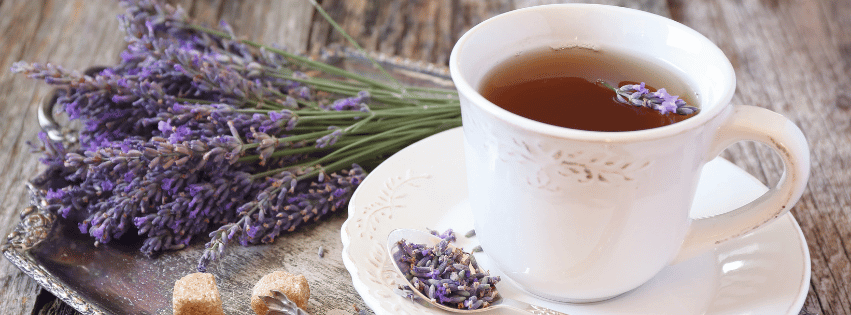
Lavender’s medicinal history stretches back thousands of years, with roots in ancient civilizations including Egypt, Greece, and Rome. Greeks and Romans valued lavender for bathing, cooking, and medicinal purposes, with Roman physicians documenting its therapeutic properties extensively. Renowned for its distinctive purple blooms and enchanting fragrance, lavender has been used for centuries as a natural remedy for stress, anxiety, and sleep disorders.
Clinical research has highlighted lavender’s benefits for sleep quality. A study published in Phytotherapy Research examined the effects of lavender tea on elderly patients with sleep difficulties. Participants consuming higher doses reported significant improvements, including reduced time to fall asleep and fewer nighttime awakenings. Additionally, these individuals experienced enhanced overall sleep satisfaction.
The most significant benefits of lavender tea emerge from its complex chemical composition, particularly its essential oils and unique aromatic compounds. Primary active compounds like linalool and linalyl acetate interact directly with the human nervous system, creating a range of remarkable health advantages. You can find lavender in LiveGood Healthy Sleep Patches.
Anxiety and Mental Health Management
Lavender tea demonstrates exceptional anxiolytic properties, directly interacting with the nervous system to reduce anxiety levels. Its aromatic compounds have been scientifically proven to calm the mind, lower heart rate, and create a profound sense of relaxation. Unlike many herbal remedies, lavender provides near-immediate neurological responses, making it particularly effective for individuals experiencing acute stress or anxiety.
Muscle Tension and Physical Relaxation
With powerful muscle-relaxing properties, lavender helps release physical tension in ways few other herbal teas can match. Its essential oils work directly on the nervous system to reduce muscular stress, promoting physical relaxation and easing bodily discomfort. This makes it an excellent natural remedy for individuals experiencing chronic muscle tension, physical stress, or post-exercise soreness.
Chronic Stress Management
Lavender stands out as an exceptional adaptogenic herb for long-term stress reduction. Its ability to regulate cortisol levels provides sustained emotional balance, helping individuals manage prolonged periods of psychological stress. The tea supports the body’s natural stress response mechanisms, promoting overall emotional resilience and mental well-being.
Lemon Balm Tea: A Botanical Stress Reliever
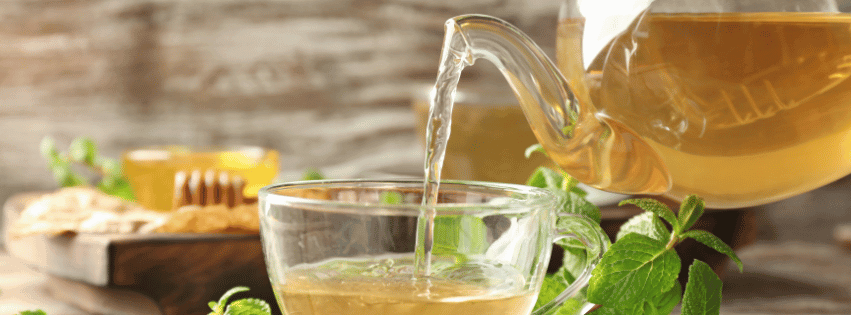
Lemon balm, a member of the mint family, has emerged as a powerful herbal remedy with remarkable potential for improving sleep and reducing stress. Native to the Mediterranean region, this herb has been valued for centuries for its calming properties and distinctive lemony aroma. Monasteries in the Middle Ages cultivated lemon balm extensively, with monks using it in medicinal gardens and developing sophisticated methods of preparation for various health treatments.
A groundbreaking study published in the journal Nutrients highlighted lemon balm’s profound impact on stress reduction and sleep quality. Researchers discovered that participants consuming lemon balm extract experienced significant decreases in cortisol levels and reported improved sleep patterns.
The sleep-promoting mechanisms of lemon balm are rooted in its complex phytochemical profile. Rich in compounds like rosmarinic acid and eugenol, the herb demonstrates significant interactions with the body’s stress response systems. Scientific research has increasingly validated its ability to modulate cortisol levels, the primary hormone associated with stress, making it a potent natural intervention for sleep-related challenges.
Anxiety and Mental Health Management
Lemon balm tea stands out for its exceptional ability to reduce anxiety through neurochemical intervention. By significantly increasing GABA levels in the brain, it helps quiet racing thoughts and provides substantial relief from anxiety-related sleep disturbances. Its gentle yet effective calming properties offer a natural alternative to pharmaceutical interventions, making it particularly valuable for individuals seeking holistic mental health support.
Stress Reduction and Emotional Balance
As a powerful adaptogenic herb, lemon balm demonstrates remarkable potential in managing chronic stress. It helps regulate the body’s stress response, supporting long-term emotional resilience and psychological well-being. The tea works by modulating neurotransmitter activity, creating a comprehensive approach to stress management that addresses both immediate emotional states and underlying psychological patterns.
Nervous System Support
The tea’s nervous system-calming effects provide multiple layers of health benefits. By gently modulating neurological responses, lemon balm helps:
- Reduce overall nervous system tension
- Promote mental clarity
- Support emotional stability
- Enhance cognitive function
- Provide mild pain relief
Passionflower Tea: Nature’s Anxiety Antidote
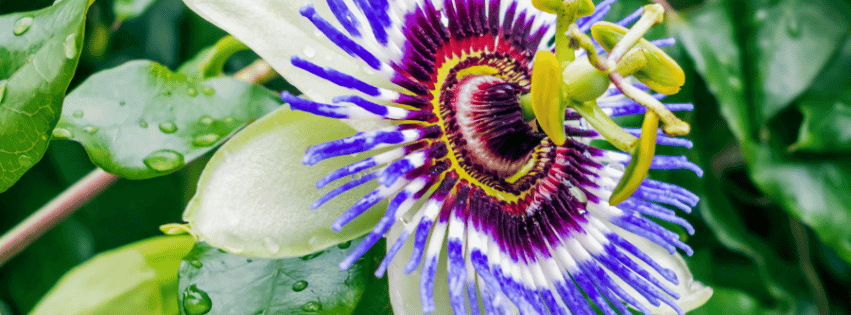
Passionflower, with its intricate and beautiful blossoms, has long been recognized as a powerful natural remedy for anxiety and sleep disorders. Indigenous to the Americas, this remarkable herb has a rich history of medicinal use among Native American and traditional healing practices, offering a holistic approach to managing sleep-related challenges. Healers used the plant to treat insomnia, anxiety, and various nervous system disorders.
A landmark clinical trial published in the Phytotherapy Research journal demonstrated passionflower’s remarkable efficacy in managing sleep disorders. The study found that participants consuming passionflower extract experienced significant improvements in sleep quality, with reduced time to fall asleep and increased total sleep duration.
The sleep-promoting potential of passionflower is deeply rooted in its unique phytochemical composition. Scientific research has revealed that the herb contains powerful bioactive compounds, including flavonoids and gamma-aminobutyric acid (GABA), which play a crucial role in reducing nervous system activity and promoting relaxation. These compounds work synergistically to address the underlying mechanisms of sleep disruption, particularly those associated with anxiety and nervous tension.
Anxiety Management
Passionflower tea stands out as extraordinarily effective for managing high anxiety. Its unique neurochemical properties directly impact brain function by increasing GABA (gamma-aminobutyric acid) levels, a neurotransmitter crucial for reducing neuronal excitability. This mechanism helps quiet mental chatter, promote deep relaxation, and provide substantial relief from anxiety-related symptoms. Preliminary research suggests that the herb may help manage mood fluctuations and reduce anxiety symptoms associated with bipolar disorder.
Nervous System Support
The tea’s primary mechanism of action centers on comprehensive nervous system support. By modulating neurotransmitter activity, passionflower helps regulate the body’s stress response, creating a cascade of calming effects. This approach addresses both immediate emotional states and long-term psychological resilience, making it a holistic solution for individuals experiencing chronic nervous system overwhelm.
Stress Reduction and Emotional Balance
Passionflower demonstrates strong potential in managing chronic stress by supporting nervous system balance and reducing overall psychological tension. Its adaptogenic qualities help individuals develop greater emotional flexibility, allowing for more effective stress navigation. The tea provides a gentle yet profound approach to emotional regulation, supporting mental health without the side effects associated with synthetic interventions.
Valerian Root Tea: A Nighttime Nerve Soother
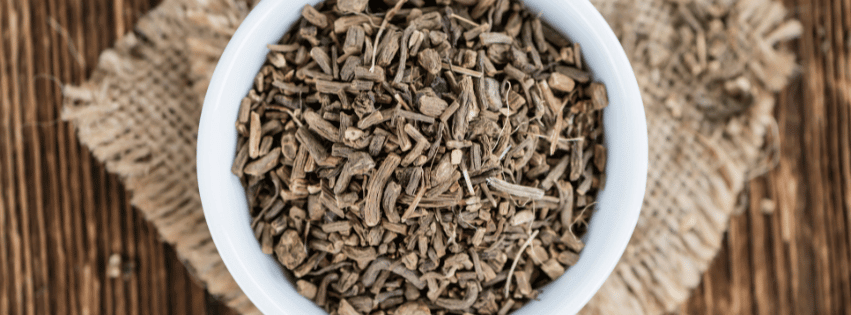
Valerian root stands as a remarkable botanical solution for those battling sleep challenges. Originating from the Valeriana officinalis plant, valerian root has been used in traditional medicine across cultures as a powerful tool for addressing sleep disorders and anxiety. In the 2nd century, Greek physicians recognized its potential for treating nervous disorders and sleep problems. During the Middle Ages, valerian became increasingly prominent in European herbal medicine.
Clinical research has consistently demonstrated valerian root’s impressive sleep-supporting properties. Multiple studies have shown that individuals consuming valerian root extract typically experience faster sleep onset and improved sleep quality. Participants report falling asleep more quickly, experiencing fewer nighttime awakenings, and feeling more refreshed upon waking.
The remarkable effectiveness of valerian root lies in its complex biochemical composition. Scientists have identified several key compounds, including valerenic acid and valepotriates, that interact directly with the brain’s neurotransmitter systems. These compounds primarily work by enhancing GABA (gamma-aminobutyric acid) levels in the brain, a neurotransmitter responsible for reducing neuronal excitability and promoting relaxation. This natural mechanism allows valerian root to provide a gentle yet profound calming effect, helping individuals transition more easily into a state of sleep. You can find valerian root in LiveGood Healthy Sleep Patches.
Anxiety and Mental Health Management
Valerian root tea provides profound anxiety reduction through its unique neurochemical interactions. By significantly increasing GABA levels in the brain, it creates a potent sedative effect that helps calm racing thoughts and reduce mental tension. Its ability to quiet the nervous system makes it particularly effective for individuals struggling with anxiety-related sleep disturbances and persistent mental agitation.
Muscle Tension and Physical Relaxation
Exceptionally effective for muscle tension, valerian root stands out among herbal remedies for its powerful muscle-relaxing properties. It directly addresses physical stress, helping to release muscular tightness and promote deep relaxation. This makes it an invaluable natural intervention for:
- Individuals experiencing chronic muscle tension
- People dealing with stress-related physical discomfort
- Athletes seeking natural muscle recovery
- Those with repetitive strain injuries
- Individuals managing physical stress
Chronic Stress Management
Valerian root demonstrates strong support for managing chronic stress by helping to regulate the body’s stress response. Its comprehensive approach to nervous system balance provides long-term support for emotional resilience and psychological well-being. The tea works by modulating neurological responses, creating a holistic intervention for sustained stress management.
Additional Herbal Teas for Better Sleep
While our previous exploration highlighted five powerful herbal teas, numerous other botanicals offer remarkable sleep-promoting properties. Understanding the unique characteristics of these herbs can provide individuals with a broader toolkit for addressing sleep challenges.
Mint (Peppermint and Spearmint) Tea
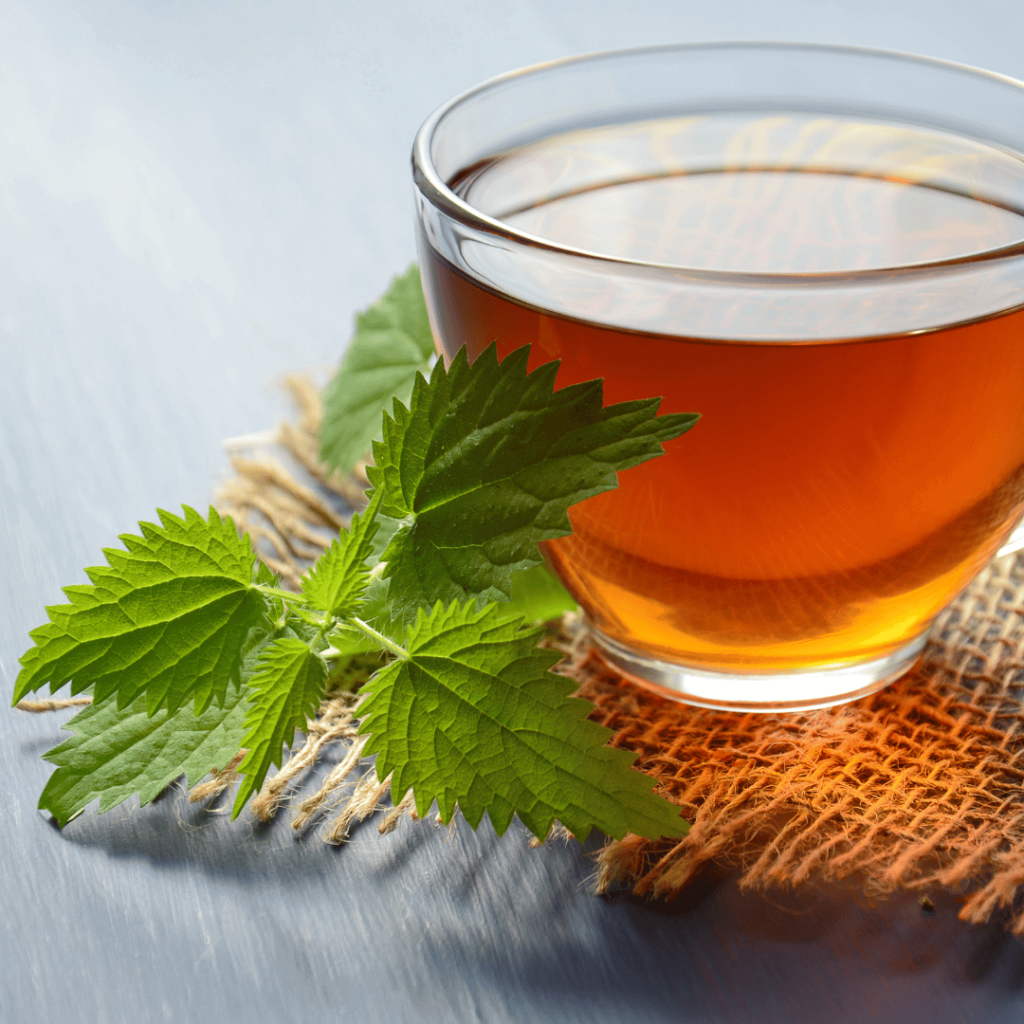
While typically associated with digestion, cool refreshing mint varieties offer subtle sleep support. Peppermint contains menthol, which has natural muscle-relaxing properties that can help reduce physical tension. It may also be added to other calming drinks such as peppermint hot chocolate. Spearmint has been found to help regulate cortisol levels, potentially supporting more balanced stress responses. These herbs are particularly beneficial for individuals experiencing sleep disruptions related to digestive discomfort or muscle tension.
Rooibos Tea
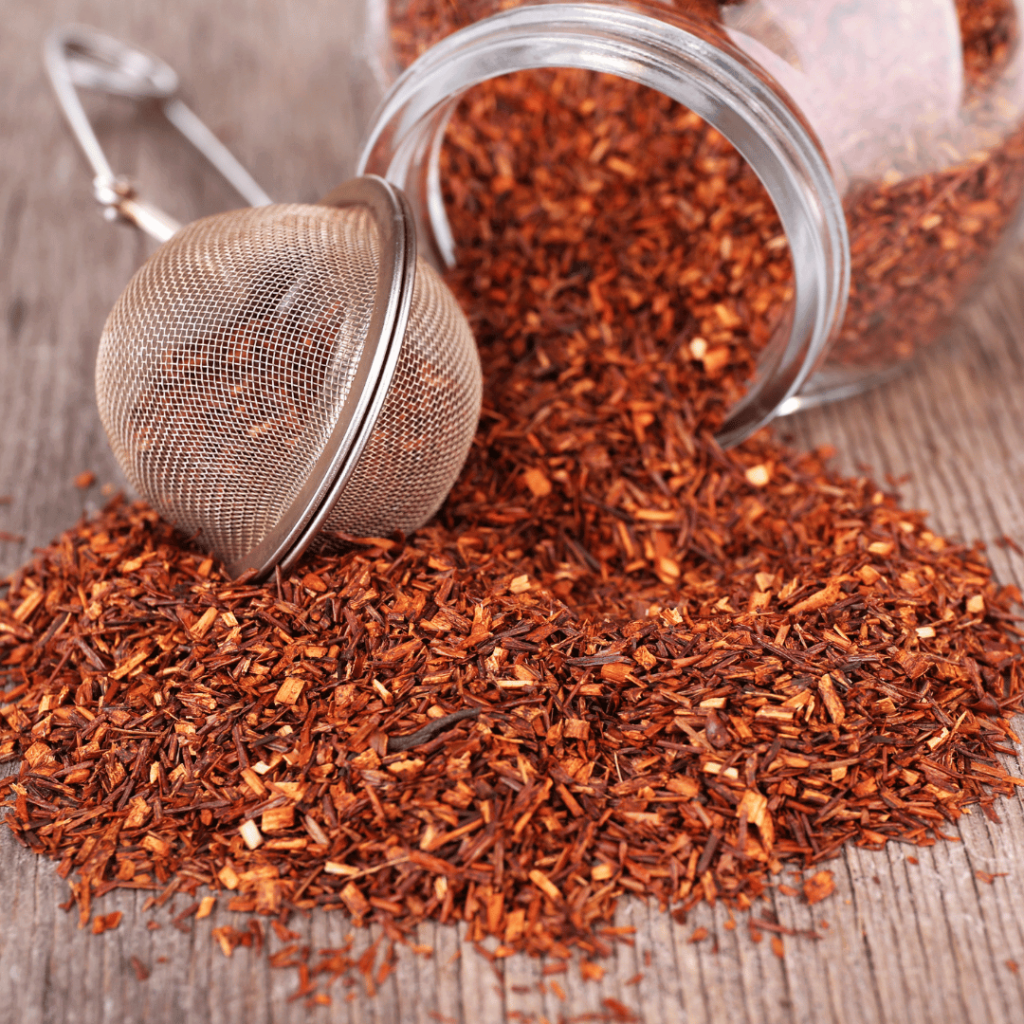
The sleep-promoting qualities of rooibos extend far beyond its delightful sweet and nutty flavor profile. Rich in powerful antioxidants such as aspalathin and nothofagin, this herbal tea provides a multi-faceted approach to supporting overall health. Studies have shown that rooibos can lower cortisol levels, the primary stress hormone that can interfere with healthy sleep patterns, potentially promoting a sense of calm and well-being.
Rose Petal Tea
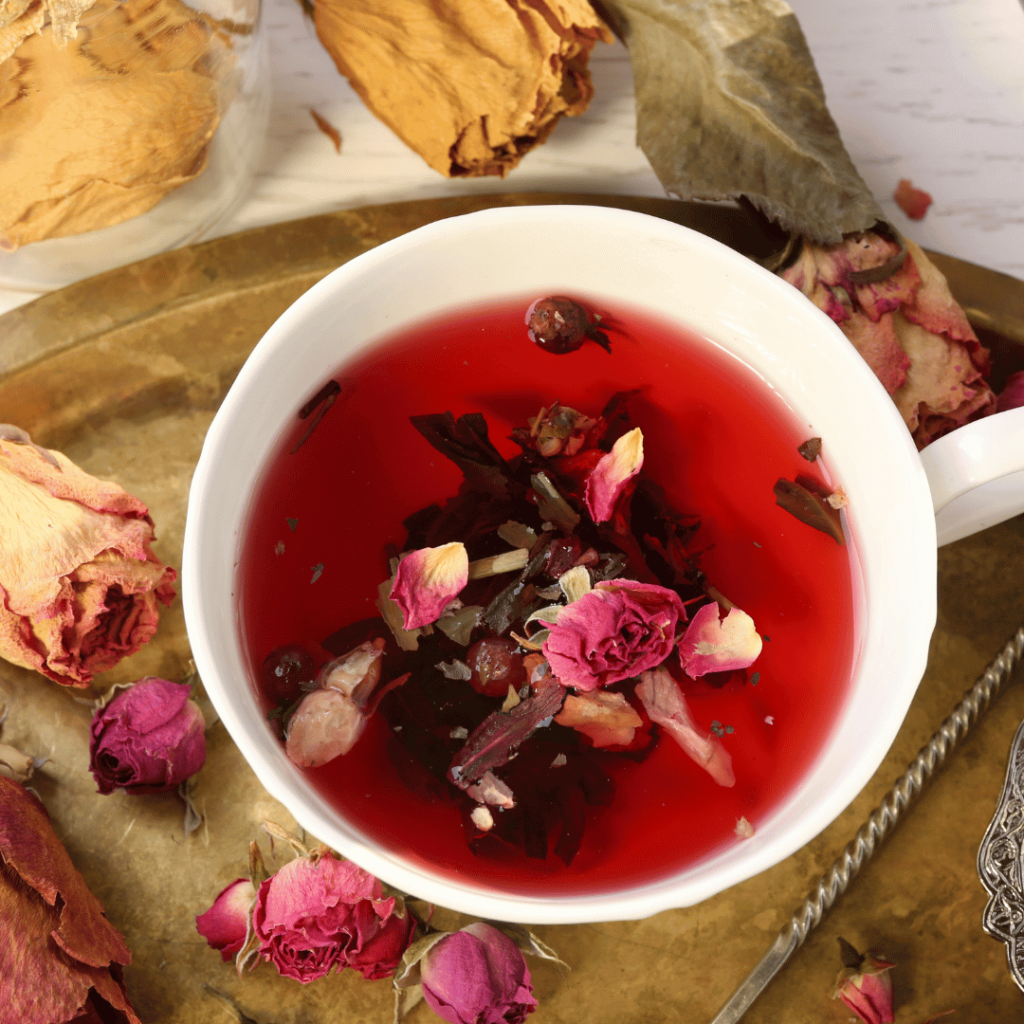
Beyond its lovely flavor of floral essence with a light sweetness, rose petal tea offers subtle sleep support. Rich in flavonoids, rose can help reduce anxiety and promote relaxation. The gentle nervine properties of rose can help calm the mind, making it easier to transition into sleep. Its mild nature makes it an excellent option for those sensitive to stronger herbal interventions.
Tulsi (Holy Basil) Tea
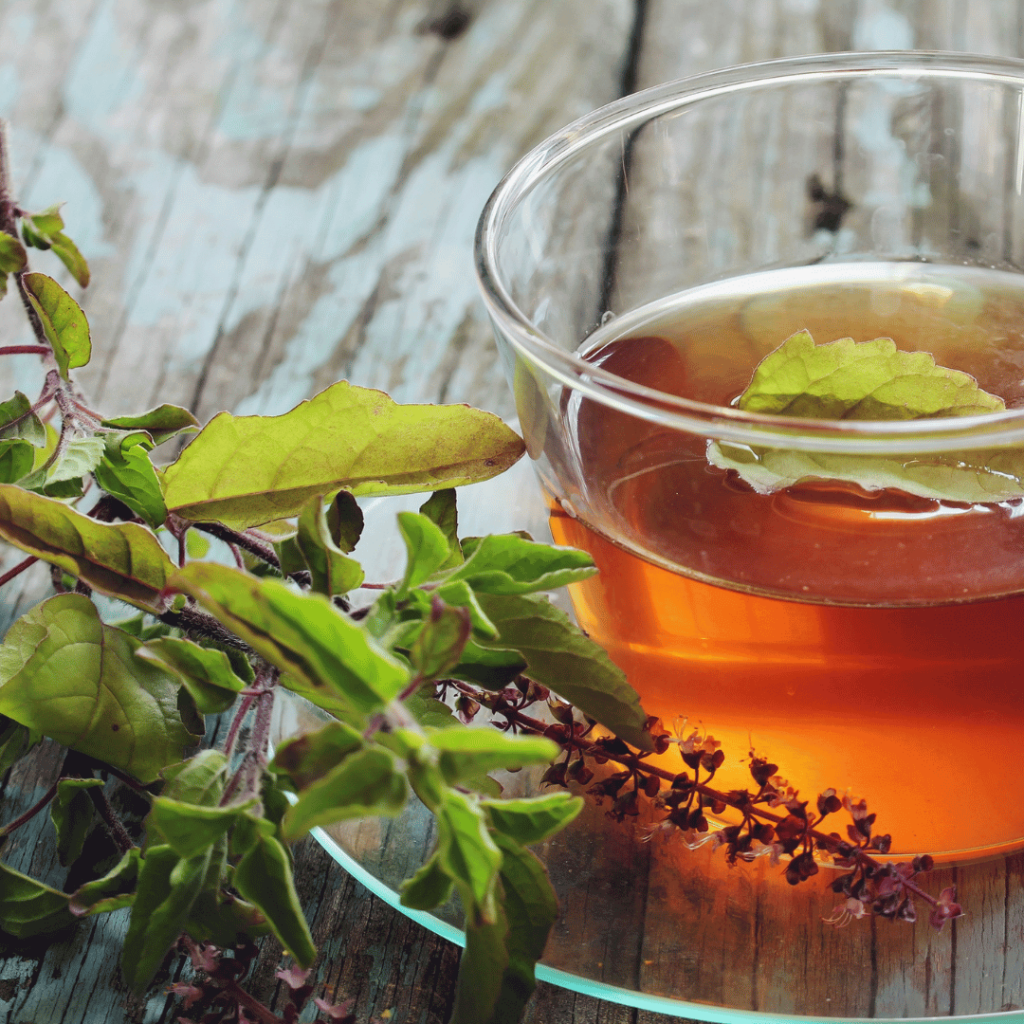
An adaptogenic herb from Ayurvedic medicine, tulsi helps the body manage stress more effectively. While not directly sedating, it supports overall nervous system balance, which can indirectly improve sleep quality. Studies have shown tulsi can help reduce cortisol levels and support more balanced stress responses, creating a foundation for better sleep. It provides a bold taste experience with complex, peppery flavor.
Magnolia Bark Tea

Traditional Chinese medicine has long utilized magnolia bark for its profound relaxation properties. Modern research indicates that compounds in magnolia bark can reduce anxiety and lower cortisol levels, creating optimal conditions for sleep. Some studies suggest it may be particularly effective for individuals experiencing stress-related sleep challenges. Its woody and bitter flavor requires acquired appreciation.
Complementary Herbal Combinations for Better Sleep
While individual herbs are powerful, creating personalized blends can offer some of the best herbal teas for better sleep. By thoughtfully combining different botanicals, you can target your specific sleep challenges and enhance overall effectiveness. Here are 5 carefully crafted herbal tea combinations, each designed to address different sleep concerns while maintaining a pleasant taste.
Nighttime Tranquility: Ultimate Anxiety and Sleep Support
Soft, floral, with gentle herbal sweetness.
- Chamomile (60%)
- Lavender (20%)
- Passionflower (15%)
- Lemon Balm (5%)
Stress Melt: Chronic Stress and Digestive Comfort
Smooth, slightly nutty, with refreshing mint undertones.
- Tulsi (Holy Basil) (40%)
- Rose Petal (25%)
- Rooibos (20%)
- Mint (10%)
- Lavender (5%)
Muscle Recovery: Physical Tension and Sleep Support
Earthy with cooling mint notes, softened by chamomile’s sweetness.
- Valerian Root (40%)
- Chamomile (25%)
- Passionflower (20%)
- Lavender (10%)
- Mint (5%)
Digestive Calm: Comfort and Relaxation
Crisp, refreshing, with subtle herbal sweetness.
- Mint (40%)
- Chamomile (25%)
- Rooibos (20%)
- Lemon Balm (10%)
- Lavender (5%)
Mind Reset: Comprehensive Anxiety and Emotional Balance
Complex, slightly woody with floral hints and smooth undertones.
- Magnolia Bark (40%)
- Passionflower (25%)
- Lemon Balm (20%)
- Rooibos (10%)
- Rose Petal (5%)
Enhancing Herbal Tea Blends with Natural Additives
Natural ingredients can elevate the therapeutic potential of herbal sleep teas.
- Honey
- Natural source of glucose that supports melatonin production
- Provides antimicrobial and soothing properties
- Helps balance the flavor of more bitter herbs
- Ceylon cinnamon
- Supports blood sugar regulation
- Adds warming properties that promote relaxation
- Enhances circulation and metabolic function
- Ginger
- Supports digestive health
- Reduces inflammation
- Provides gentle warming effects
- Turmeric
- Powerful anti-inflammatory properties
- Supports overall cellular health
- Can help reduce oxidative stress
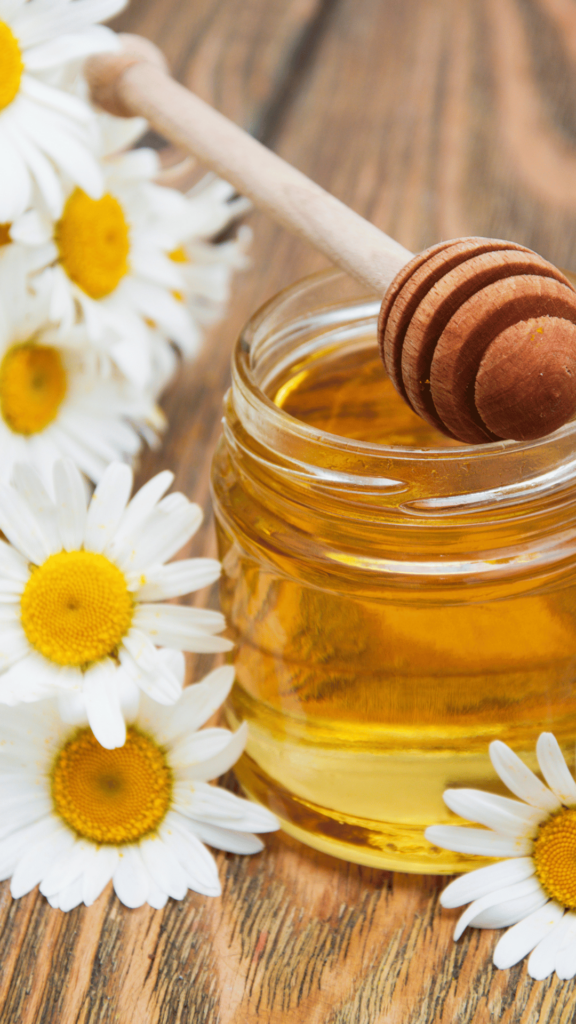
To maintain the benefits of your herbal tea, it is advisable to refrain from adding sugar or caffeine. Sugar can lead to spikes in energy levels and may interfere with the calming effects of the tea, while caffeine can counteract the relaxation properties that you are seeking.
Preparation and Maximizing Herbal Tea Sleep Support
When adding herbal teas to your sleep routine, the ideal consumption time is about 30 to 45 minutes before bedtime, allowing time for the tea’s calming compounds to take effect.
Mastering the art of herbal tea preparation is key to unlocking the full potential of sleep-promoting botanicals. While each herb offers unique benefits, understanding the fundamental principles of tea preparation can significantly enhance their effectiveness and overall sleep-supporting properties.
Proper tea preparation is more than a simple culinary task—it’s a nuanced process that directly impacts the extraction of beneficial compounds. Different herbs require specific brewing techniques to maximize their therapeutic potential. Water temperature, steeping time, and preparation method all play critical roles in releasing the active ingredients that promote relaxation and support sleep.
Water Temperature and Steeping Techniques
The steeping process is far more nuanced than simply immersing herbs in hot water.
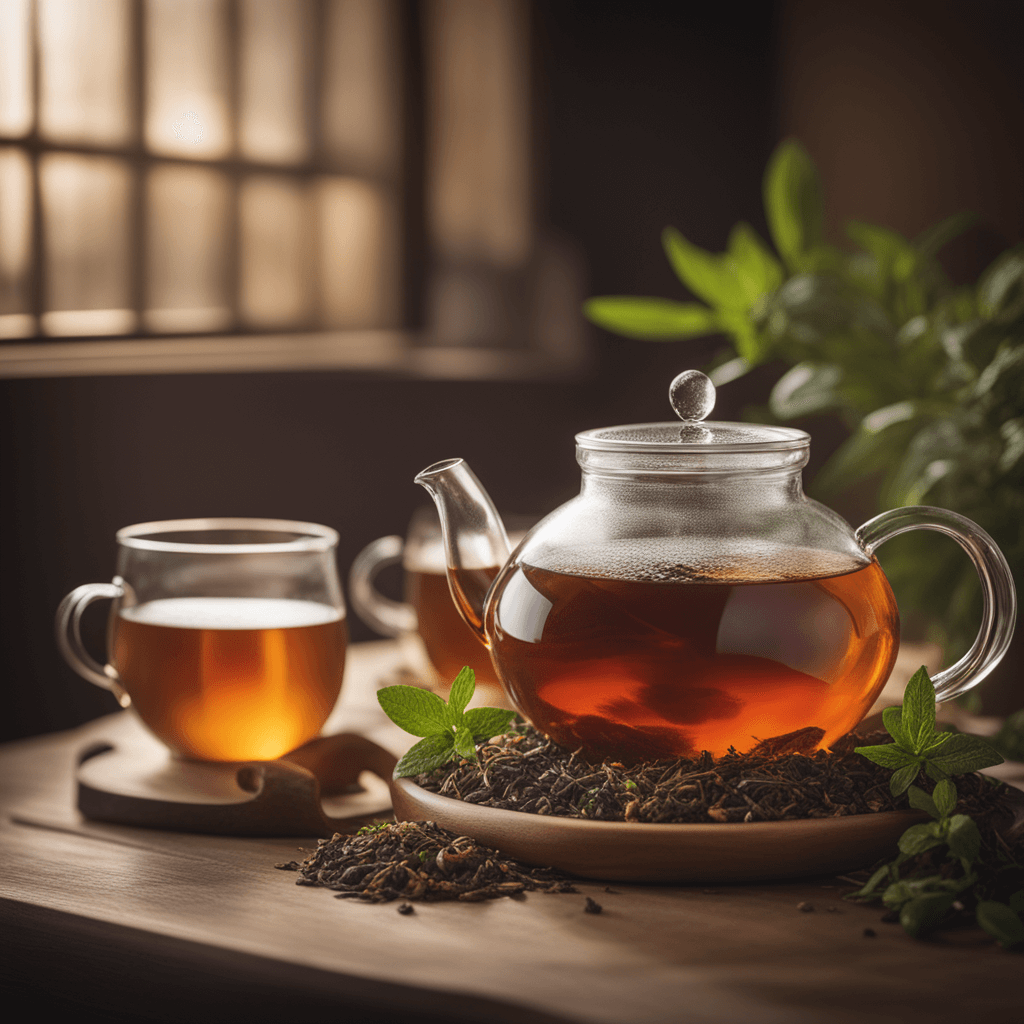
Important considerations include:
- Loose herbs generally provide more robust flavor and superior compound extraction
- Always cover the tea while steeping to retain volatile essential oils
- Typical steeping times range from 3-10 minutes, varying by herb
- Over-steeping can produce bitter flavors and potential loss of delicate compounds
The quality of water used in tea preparation cannot be overstated. Filtered or spring water is ideal, as it ensures the purest extraction of herbal compounds without introducing unwanted mineral tastes or impurities.
- Chamomile Tea: Requires water just below boiling (200°F/93°C), preserving its delicate floral compounds and gentle sedative properties. Steeping time: 5-7 minutes
- Lavender Tea: Benefits from water cooled for one minute after boiling, protecting its volatile essential oils. Steeping time: 3-5 minutes
- Lemon Balm Tea: Requires gentle temperature (around 200°F/93°C) to preserve its light, citrusy therapeutic compounds. Steeping time: 5-7 minutes
- Passionflower Tea: Performs best with water slightly cooled from boiling, maintaining its delicate anxiety-reducing compounds. Steeping time: 7-10 minutes
- Valerian Root Tea: Tolerates slightly lower temperatures (around 190°F/88°C) to prevent extracting overly bitter compounds. Steeping time: 7-10 minutes
- Mint Teas (Peppermint/Spearmint): Prefer water around 200°F/93°C to fully release their cooling, refreshing essential oils. Steeping time: 3-5 minutes
- Rooibos Tea: Withstands higher temperatures, allowing for robust extraction of its rich antioxidants. Steeping time: 5-7 minutes
- Rose Tea: Requires gentle heat to maintain its delicate floral essence. Steeping time: 3-5 minutes
- Tulsi (Holy Basil) Tea: Tolerates near-boiling temperatures, extracting its adaptogenic properties effectively. Steeping time: 5-7 minutes
- Magnolia Bark Tea: Benefits from slightly lower temperatures to prevent excessive bitterness. Steeping time: 7-10 minutes
Storage and Preservation
Proper storage is crucial to maintaining the potency of herbal teas:
- Store in airtight containers
- Keep away from direct sunlight and moisture
- Use within 6-12 months for maximum potency
- Consider storing whole herbs separately from pre-mixed blends
Creating Your Perfect Sleep Tea Ritual
Crafting a holistic sleep tea experience involves mindful practices:
- Use a dedicated tea preparation space
- Invest in quality tea tools like ceramic or glass brewing vessels
- Practice mindful brewing, treating it as a meditative process
- Consume tea in a calm, dimly lit environment
- Avoid digital screens during your tea preparation and consumption

Safety Considerations
While exploring the best herbal teas for better sleep, it’s essential to approach these natural remedies with knowledge and care.
- Consult healthcare professionals if you have pre-existing conditions
- Be aware of potential interactions with medications
- Start with small quantities when trying new herbal combinations
- Pay attention to individual body responses
This guide is for informational purposes only and does not replace professional medical advice. Individual responses to herbal teas can vary significantly.
Embracing Natural Sleep Solutions…
Our exploration of the best herbal teas for better sleep reveals a profound truth: nature offers powerful, gentle alternatives to pharmaceutical sleep interventions. Each herb we’ve explored—chamomile, lavender, lemon balm, passionflower, and valerian root—brings a unique set of properties that can transform sleep experiences and support overall well-being.
These botanical allies offer more than just a momentary respite from sleeplessness. They represent a holistic approach to health, addressing the complex interplay between stress, anxiety, and sleep. Scientific research continues to validate what traditional healing practices have known for centuries: natural remedies can be remarkably effective in promoting restful, rejuvenating sleep.
The beauty of herbal teas lies in their versatility and personalization. No single tea is a universal solution, but by understanding individual needs and experimenting with different blends, individuals can discover their perfect sleep-supporting combination. The process of exploring these herbal remedies becomes a journey of self-discovery, promoting mindfulness and a deeper connection to one’s own health.
Remember: Herbal teas are most effective when:
- Consumed consistently
- Part of a holistic sleep hygiene routine
- Tailored to individual needs
- Combined with healthy lifestyle practices
We encourage you to approach herbal teas with curiosity and openness. Start with small quantities, pay attention to your body’s responses, and don’t hesitate to consult healthcare professionals. Each individual’s path to better sleep is unique, and herbal teas can be a beautiful, natural companion on that journey.
As modern life continues to present challenges to our sleep and well-being, these ancient botanical remedies offer a beacon of hope. They remind us that solutions to our most fundamental health challenges often lie in the wisdom of nature, waiting to be rediscovered and appreciated.
Herbal Tea for Sleep FAQ
What are the health benefits of chamomile tea for sleep?
Chamomile tea contains apigenin, a compound that binds to brain receptors and promotes sleepiness. It helps reduce anxiety, relax muscles, and decrease nervous tension. Studies have shown it can improve sleep quality by helping individuals fall asleep faster and enjoy more restful sleep cycles.
Can drinking tea before bed really improve sleep quality?
Yes, certain herbal teas can significantly improve sleep quality. Teas like lavender, passionflower, and lemon balm contain compounds that interact with the nervous system, reducing stress, lowering cortisol levels, and creating physiological conditions more conducive to sleep. However, individual responses may vary.
Are there any side effects of drinking herbal tea?
While herbal tea is generally considered safe, some individuals might experience:
- Allergic reactions
- Headaches
- Constipation
- Increased appetite
Pregnant women, individuals with hormone-sensitive conditions, and those on certain medications should consult healthcare professionals before regular consumption.
How do herbal teas compare with over-the-counter sleep aids?
Herbal teas offer several advantages over pharmaceutical sleep aids:
- Natural ingredients with fewer side effects
- Non-addictive
- Support overall health beyond sleep
- Can be easily incorporated into nightly routines
- Provide additional health benefits like stress reduction and antioxidant support
However, they may be less immediately potent than pharmaceutical options and require consistent use for optimal results.
What is the best time to drink sleep-promoting tea?
Most experts recommend consuming sleep-promoting herbal teas 30-45 minutes before bedtime. This allows sufficient time for the active compounds to take effect and helps create a calming pre-sleep ritual.
Can herbal teas replace prescription sleep medications?
The best herbal teas for better sleep are powerful natural allies, but they are not direct replacements for prescription medications, especially for individuals with diagnosed sleep disorders. They can be excellent complementary approaches, but anyone with significant sleep issues should consult healthcare professionals before making changes to their treatment plan.
How do the gut and sleep relate in terms of herbal tea consumption?
The gut-brain axis plays a crucial role in sleep regulation. Herbal teas like lemon balm support digestive health while simultaneously reducing stress. A healthy gut microbiome can improve neurotransmitter production, hormone regulation, and overall sleep quality.

